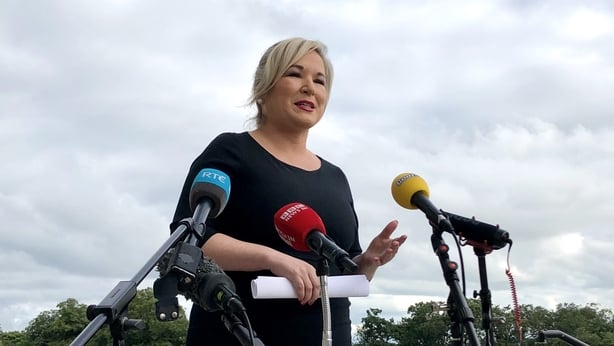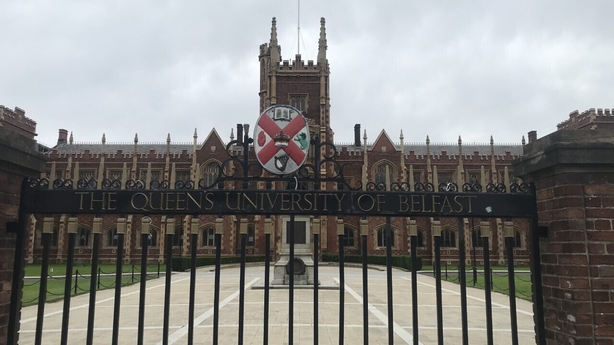Stormont leaders are to look "closely" at Covid-19 restrictions announced by the British Prime Minister, Boris Johnson, Arlene Foster has said.
This evening Mr Johnson announced a series of Covid-19 restrictions to come into effect in the UK later this week.
They include asking people to work from home where possible and ordering all pubs, bars, restaurants and other hospitality sites to close at 10pm from Thursday, with only table service allowed.
Northern Ireland first minister Arlene Foster says the new restrictions in Northern Ireland are "not a second lockdown", but are "a wake-up call", and a reminder that "we are not out of the woods" | More: https://t.co/MyvYVMoeex pic.twitter.com/Iqx8ApfLvV
— RTÉ News (@rtenews) September 22, 2020
The move affects indoor and outdoor household gatherings and does not apply to the retail or hospitality sectors.
These enhanced restrictions are in response to a sharp rise in the rate of infection across Northern Ireland in recent weeks.
Speaking this evening after Mr Johnson made a national address, Ms Foster said the measures introduced this evening are practical, and inspired by a desire to protect lives and livelihoods.
She said they were "designed to prevent the need for a return to lockdown".
Northern Ireland Deputy First Minister Michelle O'Neill says they are concerned by the "alarming levels" of Covid-19 spread in the community, adding that Northern Ireland is in a "critical period" in its response to the pandemic | More: https://t.co/MyvYVMoeex pic.twitter.com/3GUpQlBRRt
— RTÉ News (@rtenews) September 22, 2020
Deputy First Minister Michelle O'Neill said the Stormont Executive are "deeply concerned by the alarming levels of spread of the virus" across Northern Ireland.,
She said they expect to see the number of cases rise even further in the days and weeks ahead.
We need your consent to load this rte-player contentWe use rte-player to manage extra content that can set cookies on your device and collect data about your activity. Please review their details and accept them to load the content.Manage Preferences
Latest coronavirus stories
Earlier Ms Foster said Northern Ireland can avoid a "circuit break" lockdown if people adhere to the latest coronavirus restrictions imposed by Stormont.
Ms Foster said she could not rule out the imposition of a two-week lockdown to halt the spread of the virus in the region, insisting it was in the public's hands to prevent it.
She insisted such a move would be at the extreme end of the further options the executive has open to it.
A so-called circuit break lockdown will be among the measures discussed by ministers at the next meeting of the power-sharing executive on Thursday.
"I hope we don't have to get to a circuit breaker because it is quite a significant issue," Ms Foster said.
"It's a new phrase in our vocabulary that has been introduced and essentially it means that you would have an entire lockdown for a limited period of time.
"What we're trying to say to people is please work with us now in relation to these limited restrictions and, if you do that, then we may hope not to have to get into a situation where we have to take other graduated steps.
"Of course, the circuit breaker will be towards the end of those steps, because it would be a lockdown affecting the whole of society."
She added: "I don't think it's inevitable at all. That's the point I'm making. I'm saying if people work with us, listen to the messaging and actually change their behaviour, then we can stop this without the need for having to go to a circuit breaker and that's certainly where I want to be."

Ms O'Neill said a circuit breaker was one of the "tools" available to the executive.
"The issue of circuit break has been mooted and I think it's something that the executive is going to have to consider, alongside a whole range of measures," the Sinn Féin northern leader said.
"We've said that on Thursday we'll discuss what potential tools that we have, when you would potentially deploy them, and then we will communicate that to the public.
"So I think all those things have to be in the mix."
Ms O'Neill also acknowledged Stormont's latest Covid-19 messaging has become confused.
The Deputy First Minister accepted that introducing region-wide restrictions on domestic gatherings just hours before the reopening of pubs that do not serve food appeared "conflicting".
However, both leaders insisted there was sound scientific evidence to justify the contrasting steps.
They stressed that pubs provided more controlled environments where social distancing and infection control measures could be regulated and enforced.
They said the data indicated that spiralling infection rates were linked to transmission in homes and that is why Stormont had moved to prevent different households gathering indoors.
There were 75 new cases of Covid-19 reported in Northern Ireland today, from tests on 2,360 people.
It takes the cumulative total of positive test results to 9,541.
There are no further deaths, so the official Department of Health total remains at 577.
There are 36 coronavirus patients in hospital, with five in intensive care.
Northern Ireland now has the highest rate of Covid-19 per 100,000 of population of any part of the UK, with more than a thousand new cases in the past seven days.
Under the new rules, there will be no mixing of households indoors, with a few exceptions, and outdoor gatherings in private gardens will be limited to six people from no more than two households.
Police will have the power to impose fines for any breaches of the regulations.
Further restrictions, including earlier closing times for restaurants and pubs, will be considered when the Stormont Executive meets on Thursday.

Meanwhile, a virologist at Queen's University in Belfast has said that towns in Northern Ireland, including Newry and Derry, have seen a tripling in the number of positive cases of the Covid-19 virus over the last two weeks.
Speaking to RTÉ's Morning Ireland, Dr David Courtney said that the decision by the Northern Ireland Executive to further restrict movement is the right call and should go further, to restrict business activity.
Dr Courtney said the jump in cases is linked to the opening up of schools and universities and the greater restrictions should "help to keep a handle on it".
He said that people under the age of 18 made up only 10% of positive cases in the early months of the pandemic, but in the last seven days it has risen to 25% among this age profile.
This suggests it is linked to the increased interaction among young people at their schools.
In Belfast, Derry and Newry the reproduction, or R number, of the virus has risen to close to 2, and Dr Courtney said the rate in these locations has been almost 80 cases per 100,000 per day for the last week.
In Newry and Derry this amounts to a tripling of positive cases from the previous week, he said.
Dr Courtney said this was to be expected and that Northern Ireland is going to have "a see-saw approach and roll with the punches" by using restrictions when needed.
He said that hospital occupancy is at 85% but the number of deaths has not risen in the same way.
In continuing to observe social distance, wearing masks and washing hands, he said people could try to prevent the virus spreading into the elderly population.







